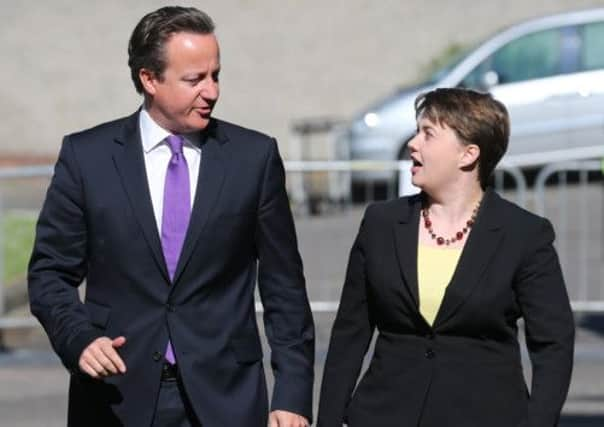Tom Peterkin: Tory plan not such a mad idea


Why indeed were David Cameron and Ruth Davidson expending effort in cajoling United Kingdom citizens from outside Scotland to argue strongly for saving the Union, when they spoke at the UK Conservative conference this week?
Ms Davidson herself offered some explanation in her speech which echoed the “we want Scotland to remain in Britain” theme later developed by the Prime Minister.
Advertisement
Hide AdAdvertisement
Hide AdThe Scottish Tory leader referred to the Canadian experience which saw an incredibly tight referendum in 1995. By just 1 per cent, the people of Quebec voted to remain part of Canada.
As Ms Davidson noted, the Quebec Sovereignty Movement was ahead in the polls until polling day itself.
“The single fact credited with making the difference between staying and going, between uniting the country or dividing the nation – was that the rest of Canada said ‘We want you to stay’,” Ms Davidson claimed as she exhorted the Tory faithful to fight for the United Kingdom.
Students of Canadian constitutional history will recall that a couple of days before the 1995 referendum the Canadian prime minister Jean Chrétien, himself a Quebecer, organised a massive rally that saw thousands of Canadians travel from all over the country to Montreal.
This impressive demonstration of the emotional attachment that other Canadian provinces had for Quebec was later credited with playing a defining role in the outcome of the vote, which had previously looked as if it was going the other way.
Whether or not, as Ms Davidson claimed in Manchester, the rally was the decisive event in the referendum is still a matter for debate.
“It made sense that Ruth Davidson made that appeal to the UK Conservatives, but the rally was not the only factor in determining the outcome when it came to a Canadian perspective,” said Annis May Timpson, the director of Edinburgh University’s Canadian Studies Centre.
While the rally boosted the “No” side, the “Yes” side was bolstered by an astute adjustment of its leadership which saw the charismatic Lucien Bouchard given a pivotal role a couple of weeks before the vote.
Advertisement
Hide AdAdvertisement
Hide AdThis, according to Timpson, was also critical and was responsible for the “Yes” side taking its slender lead in the polls in the days leading up to the Montreal rally.
Whatever happens between now and 18 September next year – judging by the Canadian-Quebecois experience – charismatic leadership and the views of those elsewhere in the UK are bound to have a bearing on the way the vote goes.